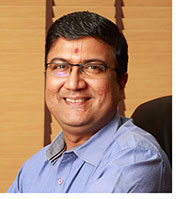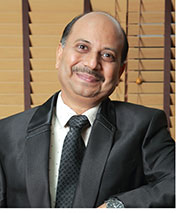|
|
|
You can get e-magazine links on WhatsApp. Click here
|
|
|
|
|
|
“Parle posted unprecedented growth during complete lockdown”
|
|
Monday, 20 December, 2021, 08 : 00 AM [IST]
|
|
|
 Since 1929, Parle Products have grown to become India's leading manufacturers of biscuits, confectionery and more. The name symbolises quality, nutrition and superior taste.Some of its biscuit brands are Parle-G, 20-20 Cookies, KrackJack, Monaco, MagixCreme, Fab! Range, Parle Marie, Milano, Milk Shakti and Hide & Seek. Some of its confectionery brands are 2 In 1 Eclairs, Kaccha Mango Bite, Cafechino, Londonderry, Kismi, Orange Bite, Melody and Mango Bite. Since 1929, Parle Products have grown to become India's leading manufacturers of biscuits, confectionery and more. The name symbolises quality, nutrition and superior taste.Some of its biscuit brands are Parle-G, 20-20 Cookies, KrackJack, Monaco, MagixCreme, Fab! Range, Parle Marie, Milano, Milk Shakti and Hide & Seek. Some of its confectionery brands are 2 In 1 Eclairs, Kaccha Mango Bite, Cafechino, Londonderry, Kismi, Orange Bite, Melody and Mango Bite.
 Mayank Shah, senior category head, Parle Products, and Krishnarao Buddha, senior category head, Parle Products, share their views on the brands, consumer preference, changing trends, food laws, pandemic and much more, in an email interview with F&B News. Excerpts: Mayank Shah, senior category head, Parle Products, and Krishnarao Buddha, senior category head, Parle Products, share their views on the brands, consumer preference, changing trends, food laws, pandemic and much more, in an email interview with F&B News. Excerpts:
Parle is one of the iconic brands of India and also the largest selling biscuit brand in the world. How has the transformation been over the years? Mayank Shah: Parle Products had a humble beginning. After initially manufacturing orange candy and toffee, the business pivoted to creating biscuits and in 1938, the company produced the first Parle Glucose biscuit, popularly known as Parle-G. It's been a great learning process all these years as the company has evolved and adapted, rolling out more diverse products. In 1941, we introduced Monaco, a salty cracker, followed by Cheeslings in 1956. Krackjack was created in 1972. In recent years we introduced Parle Platina, a premium biscuit range. The latest product offerings, that of foraying into new segments - packaged atta and breakfast cereal are also a part of the ongoing transformation to becoming a complete foods company.
Serving through generations, Parle Products has always been on the forefront as a reliable brand since its inception. The trust that we have gained has helped it reach its current position. Over the years, the brand has established itself as a household name and is exceptionally well received by consumers.
Parle Products has been a household name and consistent consumer choice for nine years. How has the brand managed to retain this key position among consumers in a competitive category like FMCG?
Krishnarao Buddha: FMCG being a competitive sector, one must keep up with the changing patterns of consumer consumption. Establishing a stronghold needs effort from all aspects. Our strong distribution network is one of the factors that gives us an edge over our competition. In addition to this, we have a strong brand positioning among Indian consumers that has enabled us to maintain their trust and confidence for decades now.
The fact that we aim to remain in touch with the current trends in the industry be it through new product launches or our marketing and branding strategies has been a great contributor as well.
Parle Products has a wide product range, making it a complete foods company. Elaborate on the vision for the company. Shah: Evolving with the requirements of the consumer has been the philosophy of Parle Products. The company started out as a confectionery producing brand and has gradually grown over the years expanding to accommodate several other categories. This year too we have ventured into the space of packaged atta and breakfast cereal further expanding this vision. As time progressed, the need for new products came up and slowly we went on to build on those parameters. We have always considered ourselves to be the ‘son of the soil’ and with each passing day, our aim is to contribute to the social and economic development of the country.
Parle's iconic ads reminisce consumers of their childhood days. How have they helped to shape the unique marketing and advertising route taken by it?
Buddha: Today’s consumers connect with brands on multiple levels. Where utility is important, it is also necessary to establish a relationship with consumers. A brand may be preferred among consumers for the value it creates for them. Our consumer research has shown that Parle-G is not just a consumption habit for the consumers but rather signifies a deeper emotional connection with the brand. We try to come up with campaigns that celebrate and focus on this emotion and connection that the consumer may feel with the brand. We try to take a route for marketing and advertising that showcases how there are relations or connections in life which may not be acknowledged very often but play a significant role in making us who we are.
Rol-a-Cola candy was a much-loved Parle offering and its taste and pricing were the point that set it apart from competition. The candy was discontinued after a while, but consumers still remembered the product and a Twitter user expressed how much he enjoyed the candy and requested a comeback. Thereafter, we got more than 10,000 tweets and we reciprocated by relaunching Rol-a-Cola and now it caters to the Gen Z market today and is receiving the same love from the consumers that it did earlier.
Elaborate on the effect of the pandemic on the FMCG industry and consumer consumption.
Shah: In the initial weeks of the lockdown, there was huge panic buying that led to people hoarding all possible products. That induced an accelerated shift towards purchasing branded items for household supplies. Food safety, nutrition, immunity, had all become buzzwords, and consequently, there was a higher propensity to buy branded products for daily household use. In terms of conversion, the pandemic was a catalyst that helped the conversion that normally would have happened in 2-3 years, in a matter of months.
In the later months of the pandemic, there was a huge surge towards health and wellness. Consumers were extremely wary of what the product they bought and the health benefits and implications of the use of that product. As a result, the industry shifted towards production of health-oriented products. Also due to the medical emergency in the country, a lot of companies started production of hand sanitisers, disinfectants, and other medical supplies.
Parle Products is known as a Swadeshi brand. How does the brand plan to recover sales to post-Covid with that identity?
Buddha: The inception of Parle as a Swadeshi brand back then was to compete with British rivals. Over time, the identity has evolved into serving the country in growth at all levels. As a company, Parle Products has woven Indian values and legacy into the brand’s philosophy. We celebrate India’s heterogeneity while invoking the sense of solidarity that unites the nation and its different cultures with the same thread.
Parle has posted an unprecedented growth during the complete lockdown due to public hoarding and panic buying. We were the first brands to have swung into action and started production to fill the void in the market. Timely availability of stock gained immense trust and confidence of the consumers and trade partners for brand Parle. Our brands came in handy for millions of migrant workers too. Consumers also took immense pride and were vocal for the local brands like Parle.
We will continue our efforts to build and consolidate our position as a favourite Swadeshi brand and will continue to serve the needs of our consumers.
What kind of R&D goes into your products? Shah: We invest into diligent market research and closely observe changing consumption patterns. In lieu of the changes happening around us, it's important to keep a tab on what is needed by consumers at any given point in time. Maintaining relevance of the product offering is key in research & development.
Food recalls rarely happen in India. What could be the reason for this?
Buddha: Food recalls or product recalls in general happen when the product is found to be non-compliant with the regulations set for them. Issues of safety, hygiene, etc. may prove to be the reason for these recalls. Indian food regulatory authorities have become extremely vigilant and are enforcing appropriate laws to ensure complete compliance. It is an extremely positive development for the Indian food processing industry. We have already witnessed a massive food recall a few years ago which is a national waste. Organisations need to comply and should incorporate stringent quality measures and checks to ensure zero food recalls.
The FSSR 2011, a comprehensive food law, is constantly updated. What are the challenges that companies face because of this?
Shah: The FSS Act is in place for laying down science-based standards for articles of food and to regulate their manufacture, storage, distribution, sale and import, to ensure availability of safe and wholesome food for human consumption. As such when any company falters on any of these fronts, it becomes mandatory for them to keep in check in accordance with the provisions of the Act. Depending on how advanced and updated a company is with the norms, the challenges faced differ from company to company.
|
|
|
|
|
|
|
|


|
|